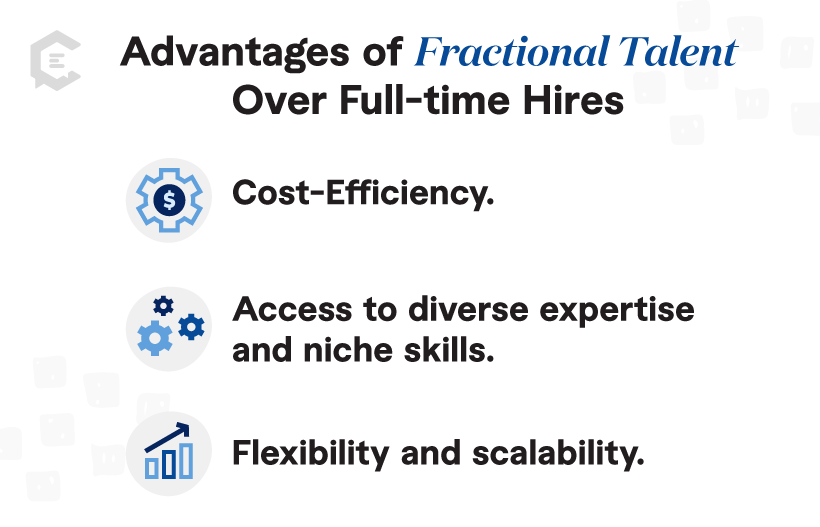Embracing fractional talent can be a potent strategy for infusing fresh ideas and stimulating dynamic growth within your business operations.
Done right, leveraging the expertise of seasoned professionals on a project or part-time basis can revitalize stagnant markets into thriving ones. This approach grants you access to specialized skills and innovative solutions without draining your resources and budget.
In this guide, we will explore how fractional talent can be a game-changer when operating in a slow-growing or stagnant market. The guide also includes real-life examples of how fractional professionals helped businesses revitalize marketing efforts and strategies through fresh ideas and innovative solutions.

Identifying Stagnation in Your Market
A stagnant market is characterized by minimal or no growth in market size, sales, or revenue within an extended period.
You can also determine stagnation in your market if:
- You face high competition with low differentiation. Stagnant markets lead to intense competition among existing players with little differentiation in services or products, leading to price wars and reduced profitability.
- Your market is too saturated. If your market has reached a point where most of your potential customers already own the service or product you offer, it’s likely too saturated, which can lead to market stagnation.
- Low innovation. The lack of new services, products, and technological advancements can mean companies in your market no longer introduce significant innovations. It can result in a stale market environment.
Innovation allows fresh perspectives, stimulates growth and differentiation, and brings changes to help your business break free from the constraints of a stagnant market.
The Role of Fractional Talent in Fostering Innovation
Fractional talent is crucial to fostering innovation in businesses operating in stagnant markets.
To understand how, let’s review the nuts and bolts of fractional talent and the perks of adopting it over full-time employees.

What is Fractional Talent?
Fractional talent refers to skilled professionals and experts in specific fields who get hired on a temporary, part-time, or project-based basis instead of being full-time employees.
Working with fractional talent allows you to access high-level and specialized skills and expertise for specific IT, finance, marketing, and HR projects or tasks without committing to full-time employees.
For example, you can get fractional talent for marketing, specifically for content writing services and content solutions.

Advantages of Fractional Talent Over Full-time Hires
Opting for fractional talent over full-time employees offers the following benefits.
- Cost-efficiency. Fractional talent requires lower financial commitment since you only pay for the time and expertise you need. On the other hand, full-time hires can cost more since it involves paying full-time salaries, benefits, and associated overhead costs.
- Access to diverse expertise and niche skills. Fractional professionals can have a wealth of experience from various projects and industries they bring to your company. They can use those diverse expertise and skills to provide insights and innovative solutions. You can also tap into specific expertise, fostering the application of highly specialized knowledge to drive innovation in particular business areas.
- Flexibility and scalability. You can scale fractional talent involvement up or down based on your project requirements and market conditions. The flexibility allows your business to be agile in quick-changing environments. It also facilitates the efficient implementation of your innovative projects.
A Real-World Fractional Success Story
Below is a real-world example of companies that experienced significant success and transformation through hiring fractional talent.

How Kos Media Leveraged a Fractional C-Level Member to Thrive Amidst Pandemic
In 2020, the CEO of progressive news blog Daily Kos stepped down, and COO Will Rockafellow stepped into the CEO role. Will wanted to focus on the bigger picture: cultivating relationships with allies, partners, and clients and pivoting in response to industry changes.
The problem was that someone needed to fill the COO role to oversee the operational tasks that the new CEO had to shoulder. Plus, teams were struggling with a lack of organization, inefficient processes, and a missing sense of urgency because they didn’t know which projects to prioritize.
The solution came in the form of a Fractional Chief of Staff.
Kos Media partnered with vChief to bring on a fractional chief of staff to help Will take back his time from operational tasks and refocus on leading the business. Chief matched Kos Media with Melanie Knaus, who had 15 years of management experience in politics, media, and non-profit organizations.
Melanie found that the company had no project management system to keep projects organized and on schedule from concept to completion. She implemented the project management system, including Enterprise Resource Planning (ERP) and Customer Relationship Management (CRM) systems, which helped Kos Media streamline processes and have a clear vision within a few weeks.
While this fractional approach was necessary at the C-suite level, fractional talent can be easily slotted in for any role, project, or task.

Implementing Fractional Talent in Your Strategy
You need leadership strategies around using fractional workers to achieve desired outcomes.
Start by identifying your business needs to match the right talent and implementing integration strategies to ensure success.
Identifying Needs and Matching with the Right Talent
Consider these tips to determine your business needs and find the best-fitting fractional talent.
- Assess the existing capabilities and gaps within your business. You can do a skills audit to evaluate the available skills and expertise within your company. You can also identify the areas with gaps or where more expertise can drive innovation.
- Specify your project scope and outcomes. Define the objectives, scope, and expected outcome of your initiatives or projects where you will utilize fractional talent. Doing so helps you determine the specific required expertise and skills. Also, set measurable project Key Performance Indicators (KPIs) to ensure you can evaluate the talent’s contributions effectively.
- Check the expertise and experience. Review portfolios and read case studies of fractional professionals to evaluate their experience and success with previous similar projects. Check references and talk to previous clients to know the talent’s work ethic, reliability, and ability to deliver results.
- Conduct interviews and practical assessments. Understand the talent’s approach to problem-solving and how they handle specific challenges by doing structured interviews. You can also do practical assessments or small pilot projects to assess the talent’s skills and compatibility with your internal team and project needs.

Integration Strategies for Fractional Talent
You need the right strategies to successfully integrate fractional talent into your company and drive innovation to overcome market stagnation.
Some of these strategies include:
- Preparing your internal team by setting expectations and assigning a point of contact to ensure everyone is on the same page and is clear on their roles and goals.
- Providing comprehensive onboarding through orientation sessions and giving the talent access to tools and resources. The process can include integrating content across your enterprise.
- Ensuring clear and regular communication among your teams and fractional talent via kick-off meetings and collaboration tools.
- Tracking progress and giving feedback through regular check-ins and performance reviews.
- Fostering a culture of innovation by encouraging experimentation and celebrating wins and milestones reached.
Leverage Fractional Talent to Innovate Within Stagnant Markets
Fractional talent brings groundbreaking ideas and solutions your business needs to reignite growth in your market. It can infuse specialized skills into your operations, allowing you to enhance customer experiences, foster an environment of continuous improvement, and drive strategic change to overcome market stagnation.
If you need fractional talent, especially in marketing and content writing services and solutions, ClearVoice can be your best solution. Connect with a ClearVoice content strategist today to see how we can help with your fractional talent needs and how we can create great content for you.



